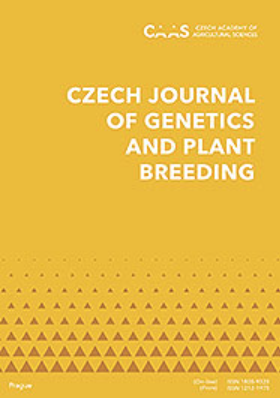Genetic diversity of released Malaysian rice varieties based on single nucleotide polymorphism markers
IF 1.8
4区 农林科学
Q3 AGRONOMY
引用次数: 8
Abstract
Understanding genetic diversity is a main key for crop improvement and genetic resource management. In this study, we aim to evaluate the genetic diversity of the released Malaysian rice varieties using single nucleotide polymorphism (SNP) markers. A total of 46 released Malaysian rice varieties were genotyped using 1536 SNP markers to evaluate their diversity. Out of 1536 SNPs, only 932 SNPs (60.7%) represented high quality alleles, whereas the remainder either failed to amplify or had low call rates across the samples. Analysis of the 932 SNPs revealed that a total of 16 SNPs were monomorphic. The analysis of the SNPs per chromosome revealed that the average of the polymorphic information content (PIC) value ranged from 0.173 for chromosome 12 to 0.259 for chromosome 11, with an average of 0.213 per locus. The genetic analysis of the 46 released Malaysian rice varieties using an unweighted pair group method with arithmetic mean (UPGMA) dendrogram revealed the presence of two major groups. The analysis was supported by the findings from the STRUCTURE analysis which indicated the ∆K value to be at the highest peak at K = 2, followed by K = 4. The pairwise genetic distance of the shared alleles showed that the value ranged from 0.000 (MR159 MR167) to 0.723 (MRIA Setanjung), which suggested that MR159 and MR167 were identical, and that the highest dissimilarity was detected between MRIA 1 and Setanjung. The results of the study will be very useful for the variety identification, the proper management and conservation of the genetic resources, and the exploitation and utilisation in future breeding programmes.基于单核苷酸多态性标记的马来西亚水稻品种遗传多样性
了解遗传多样性是作物改良和遗传资源管理的主要关键。在本研究中,我们旨在利用单核苷酸多态性(SNP)标记评估释放的马来西亚水稻品种的遗传多样性。使用1536个SNP标记对46个已发布的马来西亚水稻品种进行了基因分型,以评估其多样性。在1536个SNPs中,只有932个SNPs(60.7%)代表高质量的等位基因,而其余的SNPs要么未能扩增,要么在整个样本中的呼叫率较低。对932个SNPs的分析显示,总共有16个SNPs是单态的。对每条染色体SNPs的分析表明,多态性信息含量(PIC)的平均值在12号染色体的0.173到11号染色体的0.259之间,每个位点的平均值为0.213。使用算术平均(UPGMA)树状图的未加权配对群方法对46个已发布的马来西亚水稻品种进行遗传分析,发现存在两个主要群体。该分析得到了STRUCTURE分析结果的支持,该结果表明∆K值在K=2时处于最高峰值,其次是K=4。共享等位基因的成对遗传距离显示,该值在0.000之间(MR159 MR167)至0.723(MRIA Setanjung),这表明MR159和MR167是相同的,并且在MRIA 1和Setanjunng之间检测到最高的相异性。研究结果将对品种鉴定、遗传资源的适当管理和保护以及未来育种计划的开发和利用非常有用。
本文章由计算机程序翻译,如有差异,请以英文原文为准。
求助全文
约1分钟内获得全文
求助全文
来源期刊

Czech Journal of Genetics and Plant Breeding
Agricultural and Biological Sciences-Plant Science
CiteScore
2.20
自引率
0.00%
发文量
25
审稿时长
>12 weeks
期刊介绍:
Original scientific papers, critical reviews articles and short communications from the field of theoretical and applied plant genetics, plant biotechnology and plant breeding. Papers are published in English.
 求助内容:
求助内容: 应助结果提醒方式:
应助结果提醒方式:


